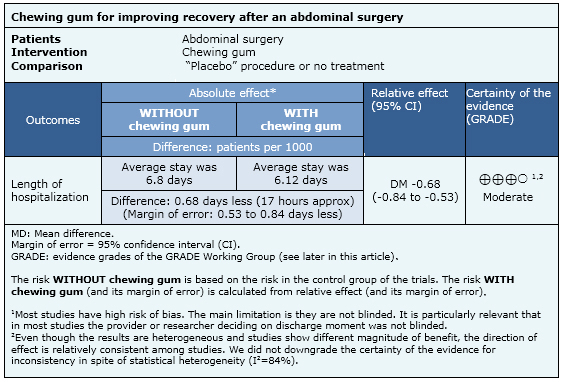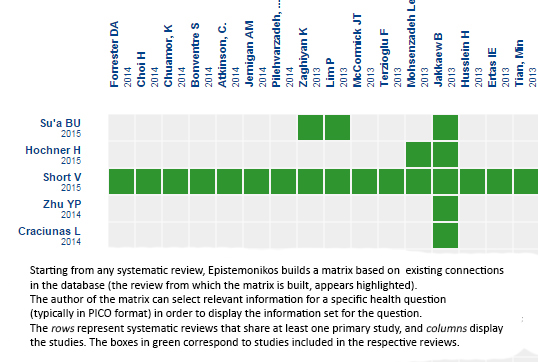Resúmenes Epistemonikos
← vista completaPublicado el 19 de junio de 2015 | http://doi.org/10.5867/medwave.2015.6162
¿Sirve la goma de mascar para acelerar la recuperación luego de una cirugía abdominal? – Primera actualización
Does chewing gum improve recovery after an abdominal surgery? –First update
Abstract
This Living FRISBEE (Living FRIendly Summary of the Body of Evidence using Epistemonikos) is an update of the summary published in November 2014, based on four new systematic reviews published since then. Postoperative ileus is common condition that delays recovery after an abdominal surgery. Early use of sham feeding with chewing gum stimulates peristalsis and would allow an earlier nutrition. Searching in Epistemonikos database, which is maintained by screening 30 databases, we identified 18 systematic reviews including 81 randomized trials. We combined the evidence using meta-analysis and generated a summary of findings following the GRADE approach. We concluded that chewing gum probably reduces the length of hospital stay after an abdominal surgery.
About the update
This article updates the November 2014 Living FRISBEE (Living FRISBEE: Living FRIendly Summary of the Body of Evidence using Epistemonikos) (doi: 10.5867/medwave.2014.11.6058) by including four new systematic reviews appeared after publication of the original summary, including a Cochrane review that brings 58 randomized controlled trials not previously identified by the existing reviews.
The new evidence incorporated in this summary led to an upgrade in the certainty of the evidence for the main outcome from low to moderate, and a small increase in the estimate of the magnitude of effect with the corresponding changes on key messages and considerations for decision-making.
Problem
Postoperative ileus is a common complication in patients undergoing abdominal surgery. This condition is due to a transient functional intestinal obstruction secondary to impaired propulsory activity.
Most cases resolve within a few days but some can evolve to a state known as postoperative paralytic ileus which is associated to nausea, vomiting, abdominal distension and pain, and also to an increase in time of hospitalization and costs.
Early use of chewing gum as a sham feeding method would stimulate peristalsis and decrease postoperative ileus recovery time and postoperative paralytic ileus, allowing earlier feeding and shortening hospitalization time.
Methods
We used Epistemonikos database, which is maintained by screening more than 30 databases, to identify systematic reviews and their included primary studies. With this information we generated a structured summary using a pre-established format, which includes key messages, a summary of the body of evidence (presented as an evidence matrix in Epistemonikos), meta-analysis of the total of studies, a summary of findings table following the GRADE approach and a table of other considerations for decision-making.
|
Key messages
|
About the body of evidence for this question
|
What is the evidence.See evidence matrix in Epistemonikos later |
We found 18 systematic reviews [1-18] that overall identified 83 studies (reported in 98 references [19-116]) including 81 randomized controlled trials. This table and the summary in general are based on the latter. |
|
What types of patients were included |
Twenty studies evaluated patients undergoing colorectal surgery, 15 cesarean section, three appendectomy, four holecystectomy, and the remaining 39 included patients with other abdominal surgeries or were not restricted to a single type of surgery. |
|
What types of interventions were included |
Chewing gum was administered for five minutes to one hour (median 20 minutes). The frequency was 12 times a day for seven studies, eight times a day in two, six times a day in three, four times a day in 11, three times a day in 55 studies and in one study it was administered once (median three times a day). |
|
What types of outcomes were measured |
Time to flatus, time to have a bowel movement, time to first bowel movement, length of stay, complications, tolerance of chewing gum, costs. |
Summary of findings
The information on the effects of chewing gum is based on 81 randomized controlled trials, from which 56 report length of hospitalization outcome, including 5,278 patients.
- Chewing gum probably reduces the length of hospital stay after an abdominal surgery. The certainty of the evidence is moderate.

Other considerations for decision-making
|
To whom this evidence does and does not apply |
|
| About the outcomes included in this summary |
|
| Balance between benefits and risks, and certainty of the evidence |
|
| What would patients and their doctors think about this intervention |
|
| Resource considerations |
| Feasibility and implementation |
|
|
Differences between this summary and other sources |
|
| Could this evidence change in the future? |
|
How we conducted this summary
Using automated and collaborative means, we compiled all the relevant evidence for the question of interest and we present it as a matrix of evidence
 Full size
Full size Follow the link to access the interactive version Chewing gum for the amelioration of postoperative ileus

Notes
The upper portion of the matrix of evidence will display a warning of “new evidence” if new systematic reviews are published after the publication of this summary. Even though the project considers the periodical update of these summaries, users are invited to comment in Medwave or to contact the authors through email if they find new evidence and the summary should be updated earlier. After creating an account in Epistemonikos, users will be able to save the matrixes and to receive automated notifications any time new evidence potentially relevant for the question appears.
The details about the methods used to produce these summaries are described here http://dx.doi.org/10.5867/medwave.2014.06.5997.
Epistemonikos foundation is a non-for-profit organization aiming to bring information closer to health decision-makers with technology. Its main development is Epistemonikos database (www.epistemonikos.org).
These summaries follow a rigorous process of internal peer review.
Conflicts of interest
The authors do not have relevant interests to declare.

